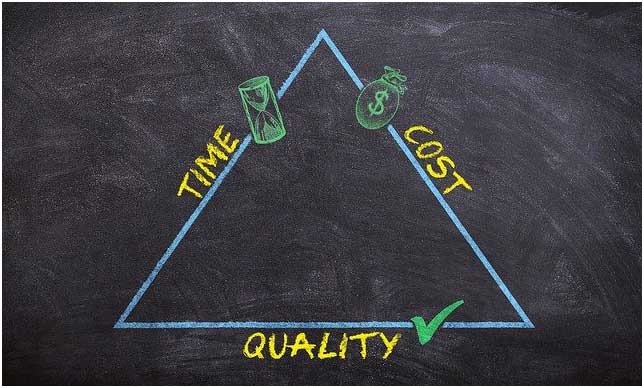Date. 1st July 2021
Cost Consultants are also known as Quantity Surveyors by profession in the construction industry. Cost Accountants and other accounting professionals can also execute duties of cost consultants The cost consultant provides estimates, and advice regarding the cost of construction works. In today’s market public and private sector requires qualified professional independent cost consultant to evaluate costs as part of the design team for construction projects.
In the construction industry, clients always seek the opportunity to employ cost consultants to deliver independent, objective cost evaluation services to employers. Conversely, many employees believe that cost evaluation services are necessary for all construction projects and as part of the general contractor’s scope of work. Although the service may appear to be a given, it doesn’t come with a potential cost and helps to protect the employer from certain amount of risk to the projects. That employer may not become aware of until when design changes & schedule of works may increase costs on the project.
Throughout a project’s development, objective unbiased cost evaluation services assure employers that their projects remain within budget with the original design is intact. The benefits are maximized when incorporated into the project’s development in the preliminary stage. As it relates to the design, the employer team must understand the function of the cost consultant, in the original design and ensure all costs are thoroughly scrutinized. Identifying risk issues and their associated costs early and during in the process to minimizes cost increases and future claims. In project development, detailed cost estimates provide a tool to reconcile the construction process, estimate, verify scope and provide a realistic budget. It can objectively challenge scope and allowances reinforces the employer and design team’s confidence in the project cost.
Employer realize that substantial time and money savings by utilizing cost consultants to execute evaluation services throughout the development of a project. Early involvement helps ensure all team members are working together with the same design intent and project vision. Having an independent cost consultant review project costs and constructability is the most efficient, cost effective way to assure the true value of money spent on the project is acquired and the employer risk is minimized.
Here are the main of roles of a cost consultants Helping determine the client's requirements and undertaking feasibility studies Benchmarking requirements against similar projects Assessing and comparing options Helping define the project budget Preparing bills of quantities Preparing tender pricing documents Collating and issuing tender documentation Assessing tenders Estimating the cost of variations Preparing valuation statements for interim certificates Assisting with the valuation of claims Preparing regular cost reports, including out-turn cost and cash flow Completing the final account Checking developing designs against the project budget Checking designs meet legal and quality standards Undertaking risk management and value management exercises Preparing cost plans, estimates and cash flow projections Advising on procurement strategy Advising on value engineering.
There are very many different names given to cost planning documents. Cost plans are generally prepared by cost consultants, often called quantity surveyors by profession. They evolve through the life of the project, developing in detail and accuracy as more information becomes available about the nature of the design, and then actual prices are provided by specialist contractors, contractors and suppliers. They range from very early initial cost appraisals through to tender pricing documents and the final account. As a consequence, there are a great number of names that can be used for key cost planning information. In cost planning there are standardized as follows. g Initial cost appraisals studies of options prepared during the feasibility study stage Elemental cost plan that is prepared during the project brief stage and carried through to detailed design Approximate quantities cost plan from the end of detailed design through to tender Pre-tender estimate prepared along with tender documentation Tender pricing document that is not a priced document, but is part of the tender documentation issued to the contractor for pricing. Contract sum that agreed with the contractor during the tender period and adjusted during the construction period Contract sum analysis that has a breakdown of the contract sum prepared by the contractor on design and build projects.
Final account agreed during the defect’s liability period of the project Cost appraisal that relate to the construction cost of the project, rather than wider project costs that the employer might incur. Which could include following fees such as equipment costs, furniture, the cost of transportation that is contracts outside of the main works. It is important that the employer makes it clear that costs should be monitored by the cost consultant and must remain within the control of the organisation. Initial cost appraisals are carried out without the benefit of a design for the project. They include employer costs that may not feature in later cost plans and as a result will almost certainly need input from the employer finance director or financial advisers. Once the initial cost appraisal is completed, the employer will decide the scope of costs that will in future be monitored by the cost consultant and those that will be monitored and controlled by the organisation.
Here some detailed descriptions of the sequence of activities to appoint a cost consultant for the various stages of work plan that is necessary for the execution of contracts Traditional contract Design and build Public and private project Construction management Cost Management.
The main objective of cost consultants is control of a project is to gain the maximum profit within the designated period within the budget. To monitor and control actual expenditure against the estimated project budget. To ensure that the employer obtained full value for money. The project budget is represented by the tender price or contract sum.


PGDCM PGDSM PGCPM MQSI SACD
Construction- Quantity Surveyor- Valuer/ Appraiser. Project Management
37 PattensenTurkeyen, Dennis Street, Georgetown, Guyana
Email. Jewelccameron55@yahoo.com